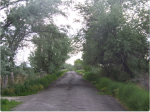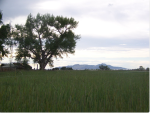Featured Author: Roger Baker
Rabbit Lane: Memoir of A Country Road
Book Review

There are not a lot of books like Roger Baker’s Rabbit Lane: Memoir of a Country Road. It is indeed musings of Rabbit Lane the rural path that runs alongside the developed highway in Erda, Utah. The road is a metaphor for the changing times. Despite it’s beauty beer cans litter the drainage ditch here and there. Old Norris farm, once a small house surrounded by grain fields is now a subdivision. Baker makes us feel the nagging pains of history lost, lives forgotten. Every now and then Roger’s reflections are invaded by the murmurs of the major road that runs parallel to Rabbit Lane, sometimes breaking through Baker’s serene contemplations on life, nature, and family. The prose is beautiful, the pacing a slow meander through Baker’s personal meaning and and appreciation for beauty. A passage about his neighbor Mary reminds us that the earth is ours only for a short time and continues at a metered pace before it slows to a crawl:
Mary’s world had shrunk to the size of her little brick house. I wondered about her being so isolated and enclosed. She existed within a small world of familiar floral wallpaper, dusty drapes, cracked and glued nick-knacks, and worn easy chairs. Misty memories hung heavy in the stale air. She no longer ventured into the light of day, staying indoors in the light of her dull lamp. Would anyone notice if she died?
I loved Baker’s book, it was comforting and hopeful. I imagined his children growing up, learning to appreciate nature and the preciousness of the moment. It was a reminder that family life should be insular while children are growing up; not a pretense but a gradual introduction to the outside world. Baker reminds us that parents should comfort, offer understanding, and join in their children’s wonder. Baker demonstrates self-awareness; one can not parent with authenticity if the world is too much with us. Rabbit Lane is punctuated with contrasts that reinforce the role Baker plays in creating a life for his children. As a city prosecutor his life was changed early in his career when a murderer went free. The man had killed his wife and children. Baker’s recollections of this horrific event stand alone amidst chapters of inspired and peaceful contemplations. When contemplating the loss Mary an elderly neighbor, Baker writes:
The weight of their lives at once pressed me into the chair and inspired me to rise above my own fear and mediocrity.
To me Rabbit Lane was a meditation, each traverse an opportunity to reflect on life and its meaning; it was also Baker’s journey as a father and husband. Some of the loveliest moments in the book are the quiet intimacies between Baker and his children: soothing their fears in the middle of the night, teaching love by example, and fostering imagination. The memoir includes Baker’s poetry and songs. One of my favorites:
FENCES
Grain-field fences march
away in a disciplined line,
cedar post after cedar post,
rough-barked,
each tugging its barbs
taut as burning guns
at soldiers’ cheeks, marching
straight and away at an acute angle
to the way I would go,
hemming me in with wicked wire
points, urging me down, at the risk
of gash and scar, the direct
and dusty disciplined road,
while a Tiger Swallowtail
lazily wafts its easy way across
the fence to flutter above
the ripe wheat tops,
and a Western Kingbird
darts here and there,
erratic, up and down,
above all artificial lines, chasing
invisible insects overhead.
Rabbit Lane: Memoir of a Country Road is lovely and poetic. The writing is welcoming and left me with an appreciation for my own family and the things I hold dear. It made me see that life is not meant to be lamented nor preserved. It is meant to be lived in reverent appreciation.
I highly recommend Baker’s Rabbit Lane: Memoir of a Country Road.
Author Excerpt
A Conversation with Roger Baker, Author of Rabbit Lane

ABOUT ROGER BAKER: A Utah graduate student couple brought Roger Evans Baker into the world while living in São Paulo, Brazil, in 1964. Nelson and Lucille reared Roger and his five siblings in East Brunswick, New Jersey. Following a second stint in Brazil and one in Portugal, Roger earned his BA in English at Brigham Young University, along with a minor in Portuguese. After law school at BYU, Roger returned to Portugal in 1991, where he studied international law as a Fulbright scholar. In 1993 Roger went to work as a criminal prosecutor for Tooele City, Utah, where in 1995 the Mayor and City Council appointed him to the position of City Attorney. He continues to work there today. In his free time, Roger rears children (7), raises chickens and goats, pulls weeds in the garden, walks Erda’s farm-flanked roads, reads, and writes the occasional poem and lullaby.

Q: I read in your Author Bio that you spent time on the east coast and lived abroad during your youth. How did you end up living out in the country?
A: I encountered a tight legal job market in 1992 when I returned from being a Fulbright scholar in Portugal. Despite being a licensed lawyer and having done international post-graduate studies, I did not find employment opportunities in my chosen field of public international law. In 1993, the job of Criminal Prosecutor opened up in the small Utah town of Tooele (then 14,000 residents); I applied and was selected. A year later I was appointed City Attorney by the Mayor and City Council, which position I have held since 1995, to the present.
The town of Erda, the location of Rabbit Lane (the road) and setting for Rabbit Lane (the book), is located in farm country a few miles north of Tooele. Angela and I wanted to find a small parcel of rural land where we could raise animals, tend a garden, rear our children, and enjoy the country quiet. I lived there 18 years before moving back to Tooele. My three youngest children continue to live in the Erda house with their mother, and the older children regularly return to visit.

Q: Your children play such a prominent role in your life and writing. They seem like a source of great inspiration. Did you and your wife always plan on having a large family? Was this always what you imagined your experience would be as a parent?
A: When conversation reveals that Angie and I have 7 children, the frequent response is, “Wow! That’s a big family!” They often ask if we always wanted such a big family. I always respond that we chose to have them one at a time. Angie, an intuitive woman and mother, informed me not long after each birth that another child was waiting for its opportunity to join our family. I trusted and honored her intuition and motherhood, and supported her in having the children she desired. I have no regrets. Each child has been a miracle in our lives. I love each dearly and feel honored to be their father. Parenting is hard work! But I accept my responsibility as a father and am committed to being the best father I can be, making sure my children know they are loved, cherished, appreciated, and trusted. I believe strongly that fathers will be held accountable for the love and wisdom they gave (or didn’t give) their children.

Q: There were a number of moments in the book when you contemplated life’s contradictions (beer cans littering the ditch near Rabbit Lane, the encroaching housing developments, some of your experiences as a Prosecutor). Did you insulate your children from these harsh realities? If not what is your philosophy on this?
A: I notice contradictions and conflicts in society. I write about them, mostly in poetry, but also in my book. I do not, however, see myself as a fiery advocate, but rather as someone who sees and who tells: a processor; a chronicler. I have strong feelings about family, history, community, and nature. But in Rabbit Lane I mostly stay away from preaching, hoping instead that the reader will come to value the same values I do through my descriptions of their beauty and merits rather from argument or pedantry.
I do my best to insulate my children from evil and harm. I do not, however, avoid teaching my children about evil and harm. I mostly try to teach them through positive example rather than through preaching, but I do frequently point out the lessons I want them to learn. When they encounter evil and harm on their own, I hope they will have first heard about it from me and seen me deal with it myself, then I support them in their own struggles to overcome the bad and choose the good.

Q: What is Rabbit Lane like now? Is it the same as you describe in your book?
A: Rabbit Lane is mostly as I wrote about it in the book. Ron Norris’ 18-acre farm, however, has been turned into a 16-lot subdivision. I touch on this in the final chapters, trying not to begrudge the construction or the new families. Those new families have turned out to be quality people, engaged in their own search for meaning, tradition, family, and goodness. They, too, are now enjoying Rabbit Lane.
Old Cottonwood, the enormous tree I write about in the chapter and poem by the same name, and which is pictured in the book, has died, its limbs rotting and crashing dangerously to the ground. The owner of the lot has had to cut off many of the limbs, which now heat his fireplace. It saddens me, but it is no one’s fault; it is just the march of time. I feel happy that I have preserved its memory and meaning.
The gurgling ditch that brought me so much joy, and which I describe often in the book, has been piped and is dry. The muskrats and ducks and snipes are gone. The watercress is gone. Again, this saddens me, but I do not begrudge the farmer who felt the need to pipe his water. I hope he (a friend) does not begrudge me writing about it in the way I did.
I wish things could remain the same: beautiful, rural, wild. That is not the way of capitalism and growth. But, Rabbit Lane should cause the reader to try to balance for himself and herself the need for both growth and preservation, change and tradition. That balance is possible. I hope my book represents and exemplifies that balance.

Q: While Rabbit Lane is a place, it also seemed to be a metaphor. Can you distill it’s meaning in a few sentences (if that’s possible?)
A: I am glad you see that Rabbit Lane, the road, is a metaphor. Rabbit Lane is a metaphor for the importance and value of the heritage of sacrifice, tradition, and beauty we receive from our ancestors, of the legacy of sacrifice, tradition, and beauty we leave for our descendants, of everything that is beautiful and noble within the human heart (with its corresponding dark side, which we spend this life overcoming). Rabbit Lane is a metaphor for the flowing energies of life, of animals, of plants, of ecosystems, of human families, of human communities, of human hearts. We are beings endowed with the power of moral choice. We must decide whether to venerate these values and resources, or whether to merely exploit them to our gain. Hopefully, we can learn how to balance their preservation with our need to live and consume.

Q: You include poetry and song in the book. Did you grow up in a creative environment?
A: I grew up in a musical home. Each of us 6 siblings chose and learned at least one musical instrument. We sang at home. We sang in church congregations and choirs. My father frequently sang to us the songs his father sang to him: Swing Low Sweet Chariot; White Wings; Sweetheart of the Rockies. These are family favorites, which we still sing at reunions.

Q: Now that your children are older and moving into adulthood do you plan on staying in the same house near Rabbit Lane?
A: I intended to grow old in the house near Rabbit Lane. Unfortunately, however, circumstances beyond my control caused me to move in the Fall of 2015, exactly one year before publishing my Rabbit Lane book. After 27 years of marriage, I found myself divorced. I have been divorced since March 2016. This occurrence ripped away many of my hopes and dreams. Still, I am determined to be the best father I can be, and pour most of my energies into this endeavor. I love my children and am committed to their wholeness, well-being, and success (as is their mother). Despite the devastating disappointment of divorce, I decided that Rabbit Lane needed to be written, to be told, to be published. Its values, I hope, are timeless, transcending our daily disappointments, aspiring to bliss and balance and joy. Some readers will wonder about the divorce, and perhaps doubt my authenticity. The fact of the divorce may shatter whatever idyllic notions of my family they have formed. But every story in the book is true, every impression authentic, and they remain so despite my personal circumstances.
I do not visit Rabbit Lane much these days. Perhaps like Old Cottonwood, parts of me died when I had to move away. But the old tree’s life remains noble and noteworthy, worthy of telling, worthy of contemplating. New trees will grow and become grand. Like Austin and Mary, Lucille and Shirley, and Reza—all departed—new generations took their place, building upon the legacy left to them. Now it is our turn to leave something worthwhile for those who follow. I hope that my book is a worthy contribution to that effort.

Q: Does your experience of Rabbit Lane change or is it a place you return to?
A: Yes, my experience of Rabbit Lane changes. This is true both because of the personal circumstances that took me away from Rabbit Lane (physically and metaphorically), and because of encroaching development that threatens to make Rabbit Lane obsolete, or to replace Rabbit Lane with a non-descript, lifeless, modern suburban road. I have urged Tooele County’s elected officials to preserve Rabbit Lane as an icon of rural Utah, to preserve its history, its lessons, its traditions, its life. We’ll see if they, together with the developers who have bought much of the adjacent farmland, will see it the way I do. That is another hope I have for the book, that it will influence Rabbit Lane’s preservation.
(Thank you, Donna, for giving me the opportunity to contemplate your questions and to examine Rabbit Lane, and my connection to it, on a deeper level. RB)

88 thoughts on “Featured Author: Roger Baker”